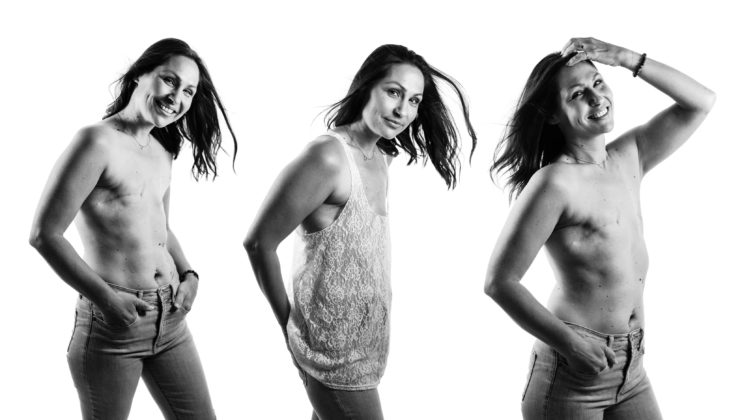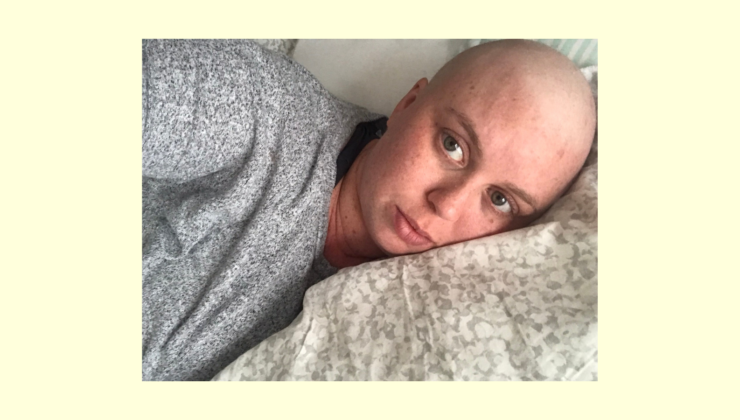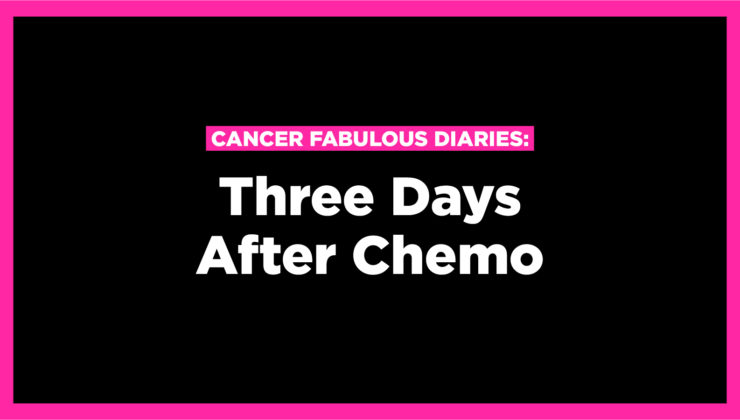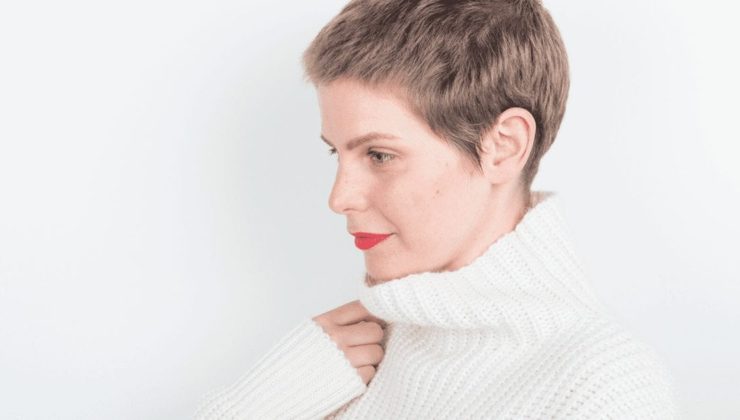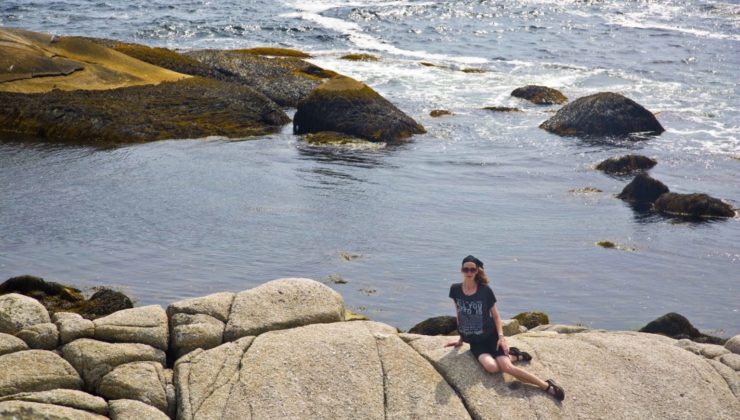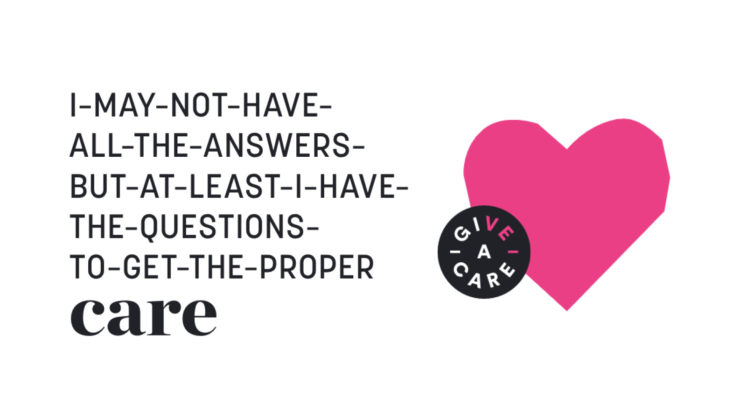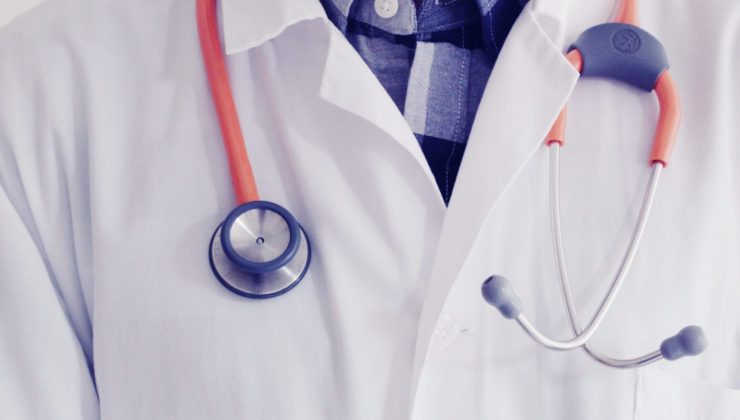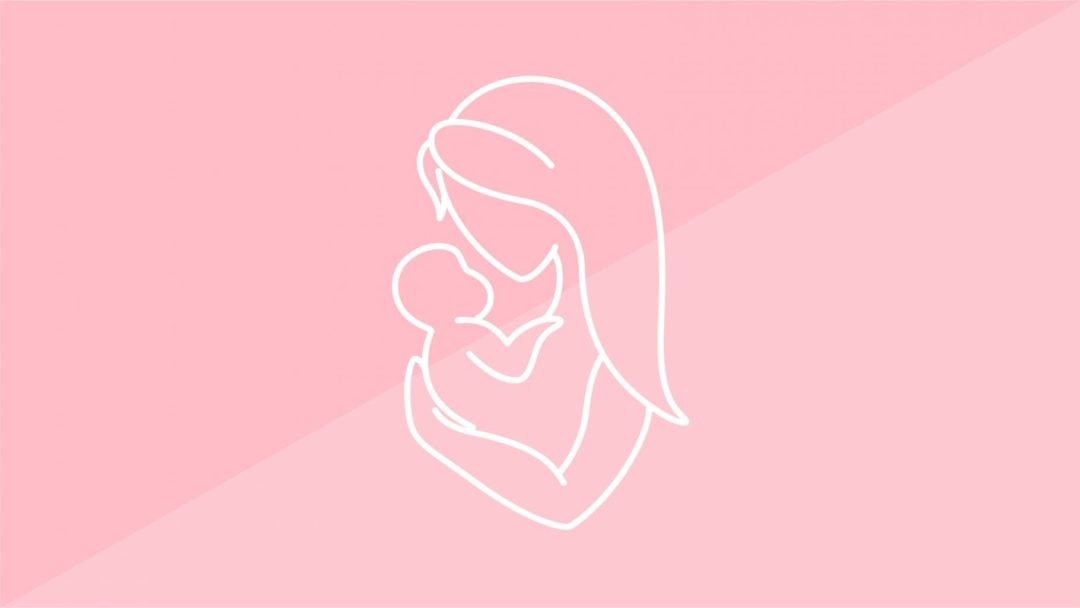
Stories From Wildfire: Homecoming
The day of my surgery arrived late in September, following six months of progressively harder and harder chemotherapy that enveloped my entire spring and summer. Now with the start of fall I was happy the chemo was over, but nervous about this next step: a “radical, modified mastectomy” (modified because it was the left breast only). The operation necessitated I spend the night in the hospital, my first time ever — unless you count when I was born thirty-five years prior, which I don’t. A bigger deal, though, was the separation from my child. Some forty miles away, my little one, age four, spent the night I was in the hospital in a hotel with her grandparents — also a first.
Despite my anxieties, the surgery went off without a hitch: my breast was removed completely, the tissue scrapped all the way to my rib cage, and no sign of the 7cm tumor remained. Thirteen lymph nodes were also removed. The following day we all — my husband and I plus my daughter and my in-laws — arrived back home around the same time in the foggy early afternoon. I was delighted to see my little one after her big night away. To my surprise, though, she was cool and kept her distance, barely even looking at me. Seeing her hesitation I realized I must be hard to look at. After all, I was noticeably weaker, ensconced in the white, cloud-like down comforter of my bed in the middle of the afternoon, bandaged, with tubes containing mysterious red and pink fluid coming out of my chest. After her initial hesitation, her desire changed and Nia wanted to jump on the bed and spring into my arms, our usual reunion after any time apart. But now it was my turn to be cautious. My husband, always my protector, stepped between us, reminding her gently but firmly that she had to be careful with me, that I was in pain and needed to heal. I asked her if she wanted to see the bandages as a compromise to the hug. Without missing a beat she said flatly, “No.”
Then she buried her face in the comforter and cried. And cried and cried. She told me between sobs she wanted me to have another surgery, a surgery to have a new breast attached. (I had only removed the breast with the tumor, and had no plans to have reconstructive surgery, something we had discussed only lightly.) A crack in our mother-daughter bond formed.
Later that afternoon, Nia watched a squawky cartoon movie in the living room while my husband, Joe, and I napped in the bedroom, and the shadows from the oak tree splashed watery patterns across the carpet in a thousand shifting shades of gray.
I felt so disconnected from my child, the chasm growing.
I was separated from her by walls and distance as well as by my pain and drowsiness, and the whole cancer situation.
After her movie finished, she went for a swim in the hot tub while I sat in the shade a few feet away from her in patio chair, wrapped in a new robe with nothing but my bandages underneath. It was a flowery kimono-style robe that I thought was cute and chic. I soon discovered nothing looks cute and chic with plastic drains snaking out from the hems. It was five o’clock. My hair was dirty. Dark circles ringed my eyes. I moved slowly and tentatively. I looked sick, and I felt sick. Cute robe or no. Rather than splash and play in the hot tub like usual, my daughter floated in the warm water motionless. She eyed me cautiously over the edge of the tub, her nose pressed against the side. Her brown eyes were dull, full of her own sadness and confusion. I saw sparks of anger and fear there as well. The crack between us continued to widen.
After dinner that night, around bedtime, my sister-in-law Whitney arrived from Montana. Like Mary Poppins arriving on a summer breeze, in through the door swept sweet relief in the form of a duffel bag packed with games, stickers, jewelery-making supplies, and colorful children’s books. She was a one-woman rescue squad, arriving to deliver us all from our dark, moody limbo. Collectively we exhaled.
“Where do you want to sleep tonight, Bug?” Whitney asked Nia, receiving my leaping daughter into her arms, the leap she had intended for me and had been denied.
“With you,” she said.
I swallowed a lump in my throat. Honestly, I had hoped Nia would sleep with Whitney so I wouldn’t be worried about jabs and kicks to my surgery site in the night, but still, her rejection of me hurt.
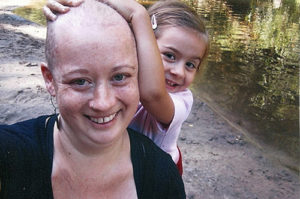
At four, Nia hadn’t had many successful “sleep-overs” and had only recently started sleeping in her own bed (at the foot of my bed). It was common for her to migrate in the night, her bare feet padding along the wood floor, from her own “little bed” into our “big bed,” the bed trembling and shaking as she crawled from the foot up to the pillows and snuggled in between us, her head pushing in against my sternum before settling back into a deep, satisfied sleep. This child of mine is a snuggler, staunchly opposed to the notion of personal space. We carried her often as she grew and even at four, when we weren’t carrying her, we were holding her hand. And when we were seated she was climbing eagerly into our laps, or up onto our shoulders. We were always, always touching. There was no boundary between our bodies. Until now.
Suddenly, overnight, with the swift removal of my breast, she wanted nothing to do with me. She slept with Whitney at night, and barely saw me during the days as I healed, still hidden away in my fluffy bed. I felt as though I could barely see my daughter standing on the far side of the chasm that had grown between us.
“Do you want to say hi to your mom?” I’d hear Whitney ask as they ate oatmeal together in the morning at the kitchen counter. “No” was always the short, matter-of-fact response.
I bit my lip and said nothing, my wound throbbing. She was mad and confused and grieving. Of course she was. She had every right. The situation was quite clear to her: my breasts were in fact her property. She had fed from them daily from birth until I found the lump and had to wean her overnight to begin aggressive chemotherapy. In the ensuing six months of treatment prior to the mastectomy she had come to believe she would resume nursing once I was done with the “big medicine.” I guess I probably knew this on some level but didn’t want to add insult to injury and so I avoided explaining thoroughly what it all meant, traveling this new road for us without a map or GPS or flashlight even. In the meantime, all through those long chemo weeks, in lieu of the comfort she received from nursing, she snuggled close and rested her head on my chest, listening to my heartbeat below the soft surface, waiting. But not only had she not been invited to resume nursing once the chemotherapy was complete, I had actually gone and done an unspeakable thing: I had a breast physically removed from my body. Her breast, cut from my body and discarded, and while I was relieved to have it and the cancer it had harbored gone, she was in deep mourning. And my chest couldn’t provide any maternal comfort. The two of us separately shed many tears over this confusing injustice.
And then, slowly, she came back to me.
After five nights with Aunt Whitney, one night she woke and cried out for me in the dark. Whitney carried her into my room and Nia tossed and turned for an hour beside me, whimpering and muttering, “Mama?”
“I’m right here, baby. I’m right here,” I murmured over and over, drinking in the smell of her — sunlight and soil and fresh cut grass — and the feel of her, her soft skin contrasting with the sharp angles of her elbows and knees.
The next day we reached another milestone: she let me read to her in the morning. And then another: after a little coaxing she let me play a board game with her and Whitney.
And then, that night, after many nights away, she decided to sleep with Joe and me.
We dimmed the lights, turned on the white noise machine and the dark green turtle night light that splashed faint stars across the walls and ceiling. We settled into the bed together and Joe picked up a bedtime book, The Tale of Despereaux. Nia lay between us. As he read, I closed my eyes and felt something I had dared hope for: my daughter began to inch toward me, closing the chasm a bit.
“This story begins within the walls of a castle, with the birth of a mouse…,” Joe read.
First her head leaned into my head, her hair brushing my eye lashes. Then her small hand gently stroked my cheek and then moved up and rubbed the new spiky hair sprouting on my head. Then, ever so slowly, her hand began to explore my wounded chest. First on the surface of my T-shirt, then after several minutes, her hand slowly crept inside my shirt and her fingers gently explored my bandages. She traced all along the smooth tape and the soft, white gauze. Ever so lightly she felt along the thin plastic tubing of the drains. She touched my stomach and felt along places on my chest not sealed in bandages. And then she exhaled deeply and her whole body relaxed as she nestled her forehead into my neck.
As Joe read on, filling the room with the daring exploits of a brave and loyal rodent, tears silently dripped from the corners of my still-closed eyes and rolled toward my ears. I dared hardly to breath lest I interrupt this gentle exploration, scare this timid creature back into her shell.
My baby had come home. April Johnson Stearns
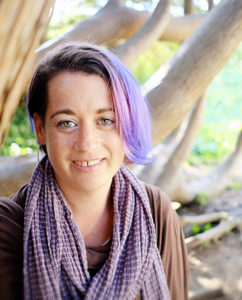
April Johnson Stearns, writer, founder of Wildfire. Diagnosed: age 35. Stage 3b, HER2+, ER/PR-.
April grew up on a 43-acre Christmas tree farm with horses, chickens, dogs, cats, and a couple of co-conspirators in the form of younger brothers. The closest neighbor was a half-mile away. Like most who don’t know what they have till it’s gone, she spent her teen years desperate to be “normal” and live in a town. Now she lives with her husband and young daughter on the coast of California in a real-life town where she can see and hear her neighbors almost all the time, but she can also ride her bike down to the beach at a moment’s notice to watch the sunset. Although she does love town life, she also likes to get away from all the hustle and bustle whenever she can to hike in the woods. @i_heart_my_life
Editor’s Note: This piece has been republished with permission from WILDFIRE Magazine, the “Phoenix” issue (Vol 1, No 1, Copyright (c) April 2016 by Wildfire Community LLC). More information available at wildfirecommunity.org
Every month, Rethink will be sharing powerful stories and poetry from WILDFIRE Magazine. Use code RETHINK for 10% off anything in the WILDFIRE Shop.
WILDFIRE Magazine is the only magazine for young women survivors and fighters of breast cancer under 45 years old. Headquartered in Santa Cruz, California, WILDFIRE is a beautiful, story-based bi-monthly magazine published on different themes relevant to young women survivors, from stage 0 to stage IV. Beautiful and ad-free! Visit wildfirecommunity.org for more info.

